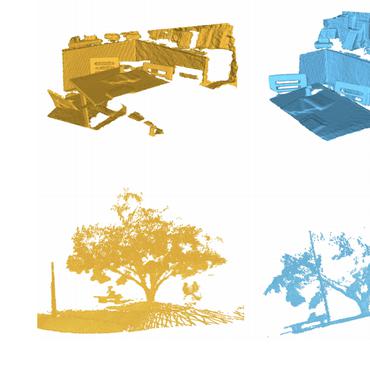Search Results for author: Andreas Wieser
Found 10 papers, 4 papers with code
DEFLOW: Self-supervised 3D Motion Estimation of Debris Flow
no code implementations • 5 Apr 2023 • Liyuan Zhu, Yuru Jia, Shengyu Huang, Nicholas Meyer, Andreas Wieser, Konrad Schindler, Jordan Aaron
Our model achieves state-of-the-art optical flow and depth estimation on our dataset, and fully automates the motion estimation for debris flows.
Dynamic 3D Scene Analysis by Point Cloud Accumulation
1 code implementation • 25 Jul 2022 • Shengyu Huang, Zan Gojcic, Jiahui Huang, Andreas Wieser, Konrad Schindler
Compared to state-of-the-art scene flow estimators, our proposed approach aims to align all 3D points in a common reference frame correctly accumulating the points on the individual objects.
Weakly Supervised Learning of Rigid 3D Scene Flow
1 code implementation • CVPR 2021 • Zan Gojcic, Or Litany, Andreas Wieser, Leonidas J. Guibas, Tolga Birdal
We propose a data-driven scene flow estimation algorithm exploiting the observation that many 3D scenes can be explained by a collection of agents moving as rigid bodies.
PREDATOR: Registration of 3D Point Clouds with Low Overlap
5 code implementations • CVPR 2021 • Shengyu Huang, Zan Gojcic, Mikhail Usvyatsov, Andreas Wieser, Konrad Schindler
We introduce PREDATOR, a model for pairwise point-cloud registration with deep attention to the overlap region.
An iterative scheme for feature based positioning using a weighted dissimilarity measure
no code implementations • 20 May 2019 • Caifa Zhou, Andreas Wieser
In the positioning stage, the weights control the contribution of each feature to the dissimilarity measure, which in turn quantifies the difference between the set of online measured features and the fingerprints stored in the RFM.
The Perfect Match: 3D Point Cloud Matching with Smoothed Densities
2 code implementations • CVPR 2019 • Zan Gojcic, Caifa Zhou, Jan D. Wegner, Andreas Wieser
Our approach is sensor- and sceneagnostic because of SDV, LRF and learning highly descriptive features with fully convolutional layers.
 Ranked #4 on
Point Cloud Registration
on ETH (trained on 3DMatch)
Ranked #4 on
Point Cloud Registration
on ETH (trained on 3DMatch)
CDM: Compound dissimilarity measure and an application to fingerprinting-based positioning
no code implementations • 16 May 2018 • Caifa Zhou, Andreas Wieser
This proposed compound dissimilarity measure (CDM) is applicable to quantify similarity of collections of attribute/feature pairs where not all attributes are present in all collections.
Jaccard analysis and LASSO-based feature selection for location fingerprinting with limited computational complexity
no code implementations • 21 Nov 2017 • Caifa Zhou, Andreas Wieser
We propose an approach to reduce both computational complexity and data storage requirements for the online positioning stage of a fingerprinting-based indoor positioning system (FIPS) by introducing segmentation of the region of interest (RoI) into sub-regions, sub-region selection using a modified Jaccard index, and feature selection based on randomized least absolute shrinkage and selection operator (LASSO).
WiFi based trajectory alignment, calibration and easy site survey using smart phones and foot-mounted IMUs
no code implementations • 2 Jun 2017 • Yang Gu, Caifa Zhou, Andreas Wieser, Zhimin Zhou
Foot-mounted inertial positioning (FMIP) can face problems of inertial drifts and unknown initial states in real applications, which renders the estimated trajectories inaccurate and not obtained in a well defined coordinate system for matching trajectories of different users.
Application of backpropagation neural networks to both stages of fingerprinting based WIPS
no code implementations • 14 Mar 2017 • Caifa Zhou, Andreas Wieser
We propose a scheme to employ backpropagation neural networks (BPNNs) for both stages of fingerprinting-based indoor positioning using WLAN/WiFi signal strengths (FWIPS): radio map construction during the offline stage, and localization during the online stage.







